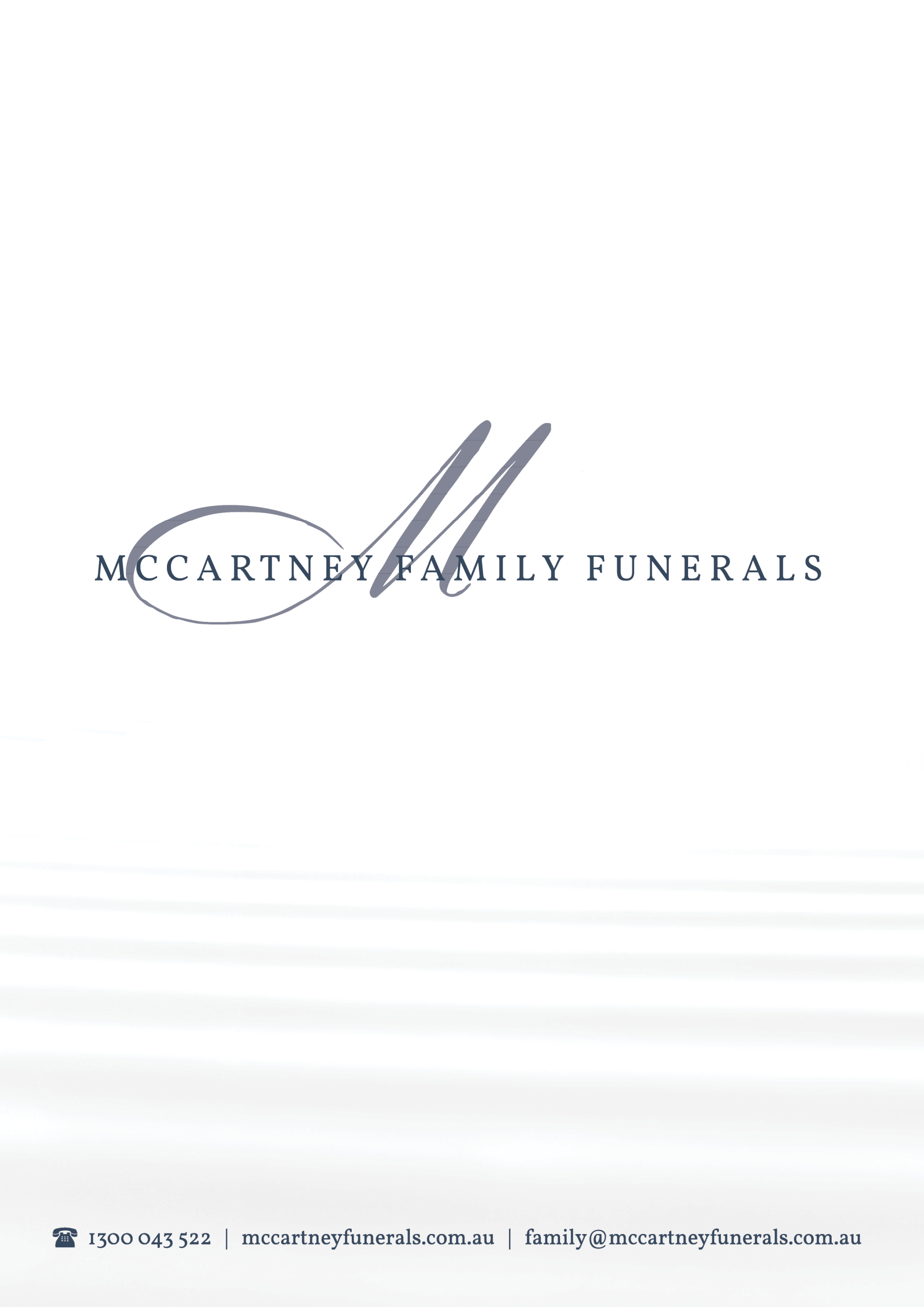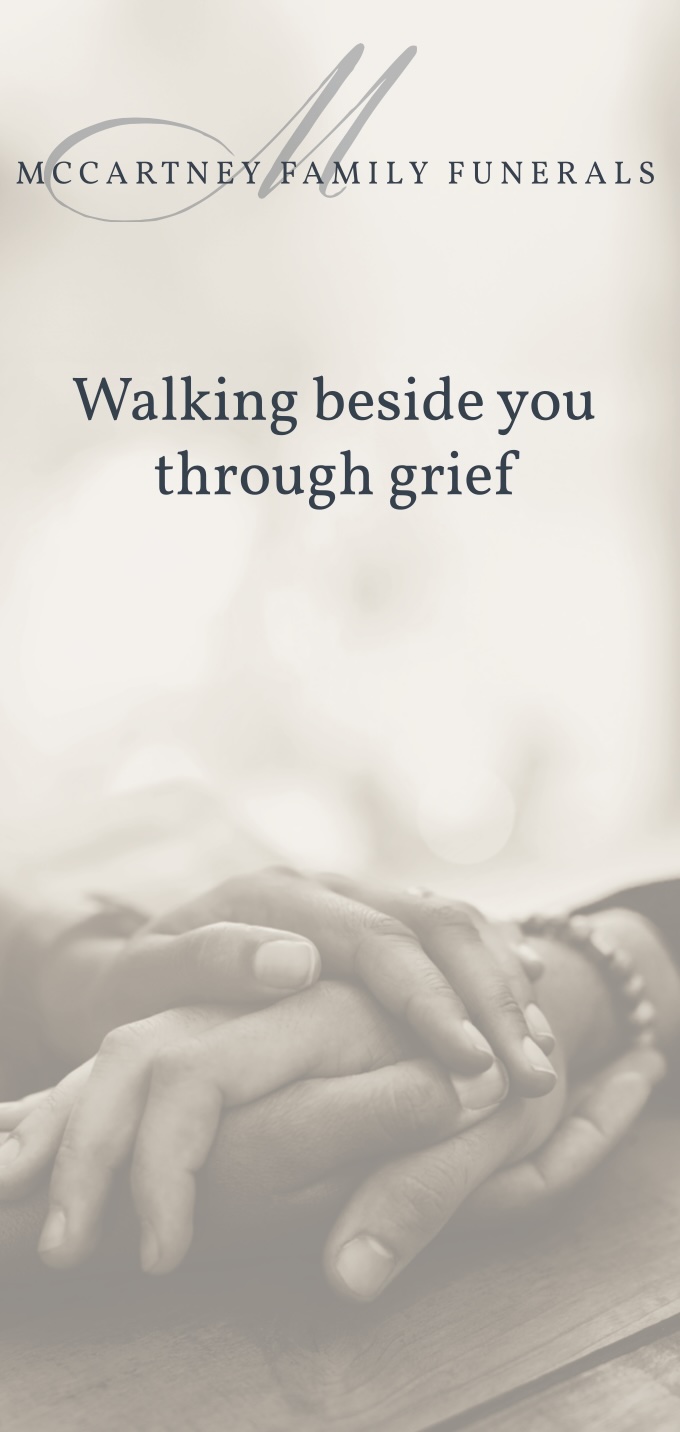Losing a Loved One
The period following the death of a loved one is traumatic and it is important that you do not feel rushed into making funeral arrangements.
Many people find it difficult to think about funeral arrangements in the immediate aftermath of a death in the family. Allow yourself time to absorb the enormity of your loss before concerning yourself with practicalities.
Remember that the timing of the funeral is entirely up to you. There is a misconception that there are only a few days in which to arrange a funeral. In fact, delayed ceremonies have grown increasingly common in recent years.
At McCartney Family Funerals, we encourage grieving families to take time to consider the funeral arrangements carefully. It is advisable to contact a funeral director as soon as possible after a death occurs, but detailed arrangements can be delayed until you feel able to make them.
The funeral occupies an important place in the grieving process and the time taken to ensure that the arrangements are well organised and appropriate is well spent. What seems like a good idea immediately following your loved one’s passing may give way to a better idea or a more suitable tribute, upon reflection.
Arrangements prior to a funeral take some time to coordinate. Mourners may have to travel from interstate or overseas and it can take time to compose fitting eulogies. By delaying the funeral just long enough to ensure that all details are carried out correctly, you may later find comfort in a final farewell that is both personal and appropriate.
During this period, family members can take comfort from the fact that your loved one will be treated with care and dignity until laid to rest.
Following the passing of a Loved one, there are a number of people that you will need to notify. Our funeral directors will assist in guiding you through this process.
You can download our comprehensive brochure on coping with grief, which offers valuable insights and practical strategies to support you through the healing process.
If you require any assistance, please feel free to call us on 1300 043 522.
Preparing to Meet with a Funeral Director
Arranging a Funeral Service or Memorial Service for your loved one is a confronting and often emotionally draining process. At McCartney Family Funerals, we work through it with you slowly and supportively, giving you time to process and work out the finer details.
We encourage you to read this section with your family so that each of you may share your thoughts and ideas for the funeral. By inviting everyone, including children, to help plan or take part in the service, you show them that their feelings matter.
This is a time to be understanding of each other’s needs. You are each experiencing grief and loss in your own way-be gentle with each other. Accept each other’s feelings and use this opportunity to share them. You may face the challenge of balancing your loved one’s dying wishes with your own needs as mourners. Know that it is okay to put the needs of your family first. Seek to fulfil the essence of your loved one’s wishes, rather than the specific details.
Allow yourself time
You may feel that you need to put the funeral behind you as quickly as possible. If so, we encourage you to rethink that approach. Sometimes, families see the funeral as a painful experience and simply want it to be over. It helps to understand that the loss of our loved one has caused our pain; the funeral can and should be the instigator of our healing. In deciding on a day and time for the ceremony, be sure you have allowed enough time to consider and carry out all your preferred options.
Considerations that may require additional time
- Relatives needing to travel
- Opportunities to view your loved one
- Preparing service sheets
- Preparing memory displays
- Compiling a photo story
- Preparing the eulogy
Information Required by Law
When a death occurs, there is a legal obligation to register the death with the Registrar of Births, Deaths and Marriages in that state. The Registrar asks for information as part of the process of registering the death and it is an essential step in the funeral arrangement that this information is available for the funeral director to record.
Information to assemble before meeting to discuss arrangements:
- Date of birth and birthplace of the deceased
- Marriage details-where, when and to whom
- Children(s) names and ages
- Parents’ full name and occupations

Our comprehensive guide will give you a good understanding of the process and what is required during the arrangement process.
Please take a few moments to download and familiarise yourself with what you can do to prepare for your funeral arrangement, and as always, if you require any assistance, please feel free to call us on 1300 043 522.
Choosing a Venue
If you or the person who has died attended a church or other place of worship, this may be the natural choice for the funeral ceremony. This is particularly appropriate when a family wishes to arrange a ceremony of traditional religious significance, such as a funeral mass.
To see a range of venue photos, visit our Funeral Service Venues page.
Possible venues are only limited by your imagination and can include:
- a cremation chapel
- the graveside
- a garden setting
- a rural property
- a private residence
- a school assembly hall
- a Church
- a beach
- a Function Centre
If you choose a venue other than a church building, a member of the clergy, or, if you prefer, a celebrant, can be arranged to officiate at the ceremony.
Some points to consider when choosing the venue for the funeral ceremony:
- How many people will be accommodated? Is the facility large enough or perhaps too large?
- Is there adequate seating?
- Do you require special facilities, for example, video projection, room for musicians, on-site catering?
- Will the service be conducted completely in one location or move in cortege to the cemetery or crematorium?
- Is the venue easy to find?
- Is there adequate parking?
- Are there time restrictions in using the facility?
A Meaningful Celebration
You can create a funeral that reflects the unique and special qualities of your loved one. The secret is to add personal touches. Here are some suggestions.
- Add your personal touch to the funeral notice in the paper. You may wish to mention your loved one’s most memorable qualities or include a few lines from a meaningful poem.
- Provide a memory book for guests to sign at the gathering. This is a lovely way for mourners to share their memories and feelings. It will become a cherished memento of your loved one.
- Place your loved one’s favourite things close by. These will have special meaning to all who share your loss.
- Light a candle. The flame of a candle represents the spirit. For some, it also represents life’s continuation beyond death.
- Give guests an order of service, including the eulogy. Personalise it with special memories, photos or lines from a poem.
- Project photo images of the person’s life during the ceremony.
- Select flowers that were meaningful to the person who died. Perhaps you can think of something more appropriate than flowers to be displayed on the coffin or casket.
- Don’t be afraid to use humour, where appropriate. Remember, the eulogy is a celebration of the life of your loved one.
- Create a memory display at the viewing, ceremony or gathering. Encourage family and friends to contribute their favourite photos. This is a wonderful opportunity to share special memories.
- Fill the room with your loved one’s favourite music – music that is special to the whole family. You may choose to use pre-recorded music or bring in musicians to honour your loved one.
- Include poetry or scripture that may have special significance for you or the person who has died.
- Involve organisations that the person was involved in, for example, the RSL, Rotary or Masonic Lodge. Some of these organisations have their own short ceremony that can be included, or you may invite them to form a guard of honour or help as pallbearers.
- Choose a meaningful funeral cortege or procession. This is the procession from the service venue to the cemetery or crematorium. The procession is a symbol of public honouring of the death. It is usually led by the hearse containing the coffin or casket. You may ask that the procession pass a significant place, for example, the family home or place of business.
- Escort the cortege with significant vehicle(s).
- Place a flower or cast petals into the grave at the completion of the committal.
- Release balloons, doves or butterflies at the graveside.
Funeral Service Format
You can choose from a variety of funeral service formats. There is no one ‘right’ way to hold a funeral. A funeral should simply ‘fit’ the person who died and the family and friends who survive that person. To help you in your planning, here are the most often asked-for formats for a funeral.
- A service held in a church or chapel, followed by a full cortege to the place of burial or cremation where the committal will take place.
- A service held in a church or chapel, followed by a private cortege to a place of burial or cremation, where only the family is present to witness the committal.
- A service and committal in a church or chapel, with no cortege. The funeral directors remove the coffin or casket from the church during the singing of the final hymn.
- A service and committal in a crematorium chapel.
- A service and committal at the graveside.
- A memorial or thanksgiving service. No coffin or casket is present at the church or chapel. A memorial or thanksgiving service usually follows a private graveside or crematorium committal.
The service choice may be either public or private.
Who will officiate or lead the ceremony?
If you or a loved one has an association with a church fellowship, your clergy will be the obvious choice. You may have not attended a church for many years but would still appreciate a clergy person to officiate at the ceremony. Your funeral director can easily arrange this. You may prefer a celebrant to lead the ceremony. This, too, can easily be arranged by your funeral director with our in-house Celebrants.
You or the person who has died may already know the clergy or celebrant. However, this is often not the case and it will be important for the clergy or celebrant and your family to meet and discuss the life of the person who died, the ceremony and your wants and needs.
